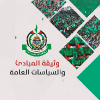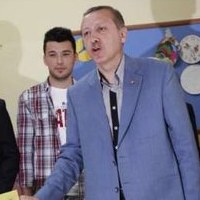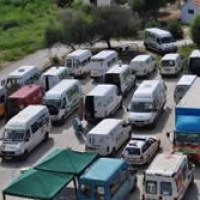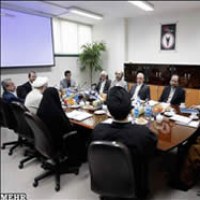![]()
Sun, Jan 30, 2011 | The Rubin Report | By Barry Rubin

In this image made available from Mousavi's election campaign media operation Ghalam News shows Iranian opposition leader Mir Hossein Mousavi, center right, addressing supporters at a demonstration in Tehran on Thursday June, 18, 2009. Tens of thousands of black-clad protesters filled the streets of Tehran again Thursday, joining opposition leader Mir Hossein Mousavi to mourn demonstrators killed in clashes over Iran's disputed election. (AP Photo/Ghalam News)
Iranian Opposition Leader Mousavi on Egypt and Tunisia Rebellions
While his view is not the same as mine, I respect the arguments made by Mir Hossein Mousavi, leader of the democratic opposition in Iran (without romanticizing his moderation excessively) and think they are worth considering.
It is interesting to point out that there are two Iranian models for what’s happening now. I am not saying that anyone is consciously thinking in these terms; this is just from the point of view of outside analysts:
— The Iranian revolution of 1978-1979: That is, a protest movement that evolves into a new Islamist dictatorship.
— The Iranian rebellion of 2009: That is a democratically minded protest movement which was repressed.
Both were against dictatorships. But, of course, in each case left a radical Islamist regime on power. Ironically, if the Egyptian rebellion fails it can easily be romanticized and is more like 2009; if it succeeds, the outcome could be very bad and more like 1979.
His January 28th statement is as follows. The translation is unofficial and Mousavi is not responsible for it:
The Middle East is at the brink of great events that could affect the future of the nations of this region and the rest of the world. Certainly the ultimate aim of what is happening is the disruption of the unjust order that has captured the fate of many nations of this region in its talons. There is no doubt that the starting point of the events we are witnessing in the streets of Tunis, Sana, Cairo, Alexandria and Suez must be sought in the massive demonstrations of June 14th, 17th and 19th (2009) in Tehran. In those days people took to the streets with the slogan of “where is my vote” to peacefully demand their trampled rights.
Today the Iranian people’s slogan of “where is my vote” is echoed in the slogan of “the people demand the overthrow of the regime” in Cairo, Suez and Alexandria. To find the roots of these connections and similarities we need not go too far afield. It suffices to compare the manner of the recent elections in Egypt with that of our own where the head of the “Guardian Council” blithely states that there is no need for the votes of millions of “Green” [opposition] citizens. If we monitor the collapsing regimes of the Arab world and the Middle East we will see that in all these regimes social networks, the press and the virtual space have been assaulted and that the internet, the messaging and mobile systems are shut down. Everywhere pens are broken and dissidents are imprisoned.
Unfortunately the interests lurking behind ruling ideologies in this country don’t allow the realities to show themselves as they are. Subservient orators speaking from official podiums turn a blind eye to the corrupt and tyrannical activities of the pharaoh of Egypt [President Husni Mubarak] who has created this explosive situation by arrests, forced confessions, legal harassment and the plundering of the people by the hands of well-connected cliques. They underline the Egyptian “people’s day of anger” but fail to mention that this day of anger is the result of inefficiency and corruption at the highest levels, squandering of the public funds, restriction of written and spoken word and… executions and executions and executions, the setting up of gallows in public for terrorizing the people. They don’t say that if the regime respected the sovereignty of the people to determine its own fate and if it refrained from stealing the recent Egyptian elections, it would not be facing the demand of “overthrow of the system” by the respected people of Egypt. Or maybe they are not aware that the continuation of the policy of domination and terror finally turns into its own opposite rendering “the day of anger” and days of national fury inevitable. The Pharaohs usually hear the voice of the people when it is too late.
Our nation admires the glorious revolution of the people of Tunis and the uprising of the people of Egypt and Yemen and other nations in the region to attain their rights. We salute the courageous and vigilant people of Egypt, Tunis, Jordan and Yemen and implore the merciful God to grant them victory in their struggles to achieve their rights.
Mir Hossein Mousavi



 RSS
RSS










Iranian Opposition Leader #Mousavi on #Egypt and #Tunisia Rebellions | #Iran http://j.mp/eqLCGt
RT @CrethiPlethi: Iranian Opposition Leader #Mousavi on #Egypt and #Tunisia Rebellions | #Iran http://j.mp/eqLCGt